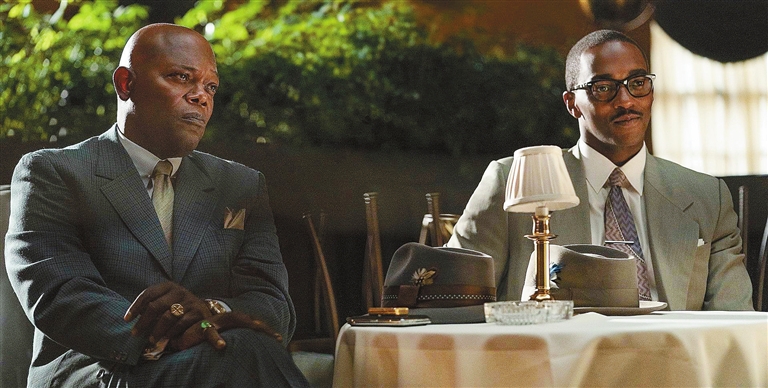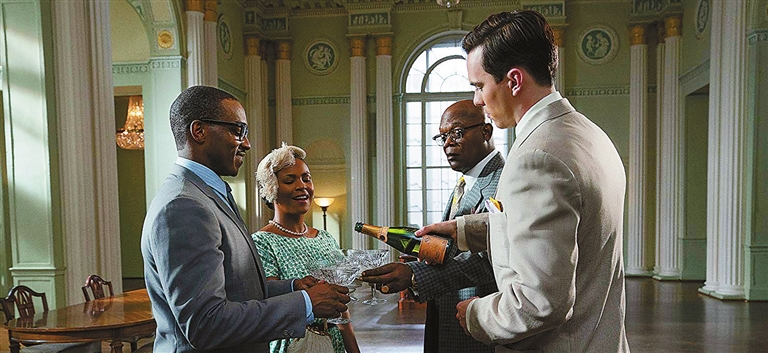

Starring: Anthony Mackie, Samuel L. Jackson, Nicholas Hoult, Nia Long, Colm Meaney, Paul Ben-Victor, Jessie T. Usher Director: George Nolfi “THE Banker” is one of the rare movies centered on a bank that isn’t about robbing it. That doesn’t mean the film is short on scams or deceptions. Based on historic events that took place in the 1950s and ’60s, “The Banker” tells the true story of Bernard Garrett (Anthony Mackie) and Joe Morris (Samuel L. Jackson), a wily pair of African-American entrepreneurs who made themselves part of the real-estate game in Los Angeles, with the goal of getting rich (which they did) and, at the same time, of breaking the color line, making it possible for black citizens to move into formerly all-white neighborhoods. Knowing that the real-estate business is the right arm of the banking business, the two sought to maneuver their way into the latter. Yet due to the color of their skin, they could barely get through the door. So they recruited a white man, a home-repair worker named Matt Steiner (Nicholas Hoult), to act as a front for them. They trained him to walk like a banker, talk like a banker, and think like a banker. That’s when the plot thickened. “The Banker,” if you look at it through one lens, is a U.S. Civil Rights drama, and a highly original one, since it focuses on men who have the audacity to dream big — not just about political freedom and racial equality, but about making money — at a time of squelched opportunity. It’s a dead-serious story, but it has a sneaky caper side, since Garrett and Morris, in order to make themselves two of the first African-American bankers, have no choice but to act as con artists. Once they start using Steiner as a front, the two dress up, as a chauffeur and a janitor, to go into the banks and spy on board meetings. Talk about a disguise that’s also a social metaphor. Beyond that, the film has a superb cast, with each actor biting into his role in a different showpiece style. Mackie plays Garrett as a deadpan shark in impeccable silver suits — a numbers wizard with a mind that won’t quit, though his aggression remains concealed behind a pair of horn-rims. Jackson’s Morris, who we first encounter as the lusty, tippling owner of an L.A. jazz club, is his own kind of deceptive hustler; he owns buildings all over the city, and bases every move on a ruefully vivacious perception of how little he trusts … anyone. The white man? Not at all. The black man? A little bit, but never too much. Jackson’s performance is so jaunty that it takes a while to see how much hard-won cynical wisdom he packs in there. “The Banker” aims high. It doesn’t dumb down the banking jargon or try to trick up the front-man stuff into some sort of facile racial suspense thriller. It’s a movie about finance: how it operates, how to succeed. It’s a movie, to a large degree, about things that happen on paper, and “The Banker,” at least on paper, must have looked like a winner and a knockout. But as directed by George Nolfi (who co-wrote the script with three other writers), there’s something staid and contained about it. Visually, it’s got a picturesque but antiseptic made-for-streaming quality, and as drama it’s like a deep-dive magazine article in movie form. You may wish that you were reading about these events in The New Yorker, because the movie is so choked with neutral detail that it’s a little bloodless. It lacks fire. The second half of “The Banker” is all about how Garrett, in 1963, leads his partners to buy the Mainland Bank back in Willis (with Steiner, once again, as the front), so that he can give loans to black businesses there and build an African-American middle class in his old Texas town. This becomes the film’s political statement: that without the support of banks, black Americans were cut off from the possibilities of wealth-building. No right-minded person would disagree, yet as astute as the point may be, for a dramatic feature it’s an awfully wonkish message. And the way that Garrett’s scheme comes apart seems not so much wrenching as, simply, inevitable. “The Banker” fills in a slice of U.S. history you probably didn’t know. But it’s history written with vacuum-packed lightning. The movie is now being screened in Shenzhen. (SD-Agencies) | 
